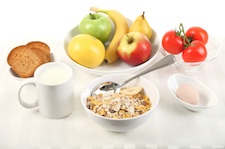Eating a healthy diet
Do you eat a healthy diet? It's hard to define, but looking around at Britain's growing waistlines, it's reasonable to assume that many people don't eat a healthy diet.
 A healthy diet is one that meets all your nutritional needs, but more than that, it should also adhere to the maxim that all medical students are taught in the first year of medical school - "First, do no harm."
A healthy diet is one that meets all your nutritional needs, but more than that, it should also adhere to the maxim that all medical students are taught in the first year of medical school - "First, do no harm."
The problem is that many of the commercially made foods that we eat - from processed microwave meals to junk food - are actually harmful when eaten regularly. Healthy eating therefore starts with avoiding foods that are actually bad for you.
When we talk about these types of food, it doesn't mean that you can't eat them at all, it simply means that you should only eat them occasionally, not as a part of your everyday diet, and you should understand the consequences, what they do to your body. They include:
- Crisps
- Biscuits
- Sweets
- Fizzy drinks
- Excessive alcohol
- Chips
- Take away food
- Ready made meals
- Highly processed foods
What all of these have in common is that they contain an excess of fat, salt, chemicals, and calories. They interfere with your body's chemistry, your energy levels, your weights, your moods.
Our body is designed to maintain a steady state, and will do so if you give it regular input of natural foods. If you fill up on junk, you are conducting an uncontrolled experiment on your body.
As you may have noticed, these are the same foods that tend to contribute to weight gain. We gain weight not because of the odd dessert we eat, or an extra slice of toast once a week, but because of the things we do day in and day out - limiting your intake of these foods is therefore also one of the best things you can do to avoid gaining weight.
Healthy eating involves ditching the fatty foods and the fast foods and cooking more of your own healthy meals. You need to focus on getting a good variety of the main macronutrients - protein, fiber, fat and carbs.
In particular:
Protein:
Good sources of protein include chicken, lean cuts of meat, fish, beans, eggs, and low fat dairy. Protein feeds your muscles and helps you to feel full - you should aim to have some protein with every meal.
Carbs:
Carbs are the body's main fuel source. The problem is that many people get most of their carbs from highly processed wheat flour and sugar. Aim instead to get your carbs from fresh fruit and vegetables, supplemented with whole grains such as brown rice and whole wheat.
Fat:
Fat is essential but many people get too much saturated fat - saturated fat is found in fast foods, butter, cream, cheese, other full-fat dairy products, and fatty meat. Instead, look to eat foods rich in omega-3 fatty acids. These include salmon, herring, black cod, hemp seeds, flaxseeds, and walnuts. For cooking, use only extra-virgin olive oil.
Finally, aim to drink 6-8 glasses of pure water a day.